How to Reduce Facial Hair Growth Due to PCOS Naturally
- Share on Pinterest (Opens in new window)Pinterest
- Share on Print (Opens in new window)Print
- Share using Native toolsShareCopied to clipboard
- Share on X (Opens in new window)X
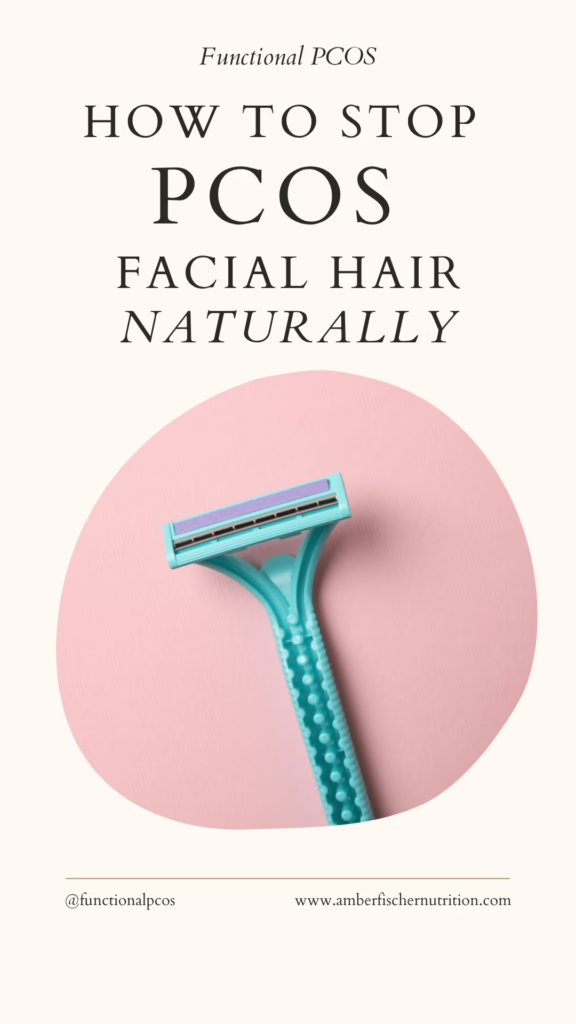
The root causes and what you can actually do about them
If you’ve ever felt frustrated, embarrassed, or exhausted by facial hair growth with PCOS, please know: you’re not alone, and it’s not your fault. That’s one reason I put together this article on how to stop facial hair growth due to pcos naturally.
Facial hair (also called hirsutism) is one of the most distressing symptoms of PCOS, and one of the least talked about in a real, actionable way.
But here’s the good news: while there’s no magic pill, you can reduce facial hair growth naturally by targeting the hormonal imbalances that drive it.
Let’s break down what’s really happening and what to do about it.
My Journey with Facial Hair Growth in PCOS
I’m not just a functional nutritionist, I also have PCOS and have been living and working through my symptoms for as long as I can remember. My passion for helping PCOS hair growth comes from my own experiences with it.
Over the years I’ve seen a connection with my personal facial hair growth and mineral deficiencies (zinc), insulin resistance, and high cortisol from overtraining. I’ve also seen the implementation of certain lifestyle changes (a daily matcha- Read more about the benefits of Matcha for PCOS here) and supplementation of N-acetyl cysteine daily, along with diet and exercise changes have made a huge difference in my personal hirsutism journey.
I wrote my course PCOS Facial Hair Freedom to walk step by step through the whole process of how I tackled my facial hair and how you can too! Find more about it here.
Why Does PCOS Cause Facial Hair Growth? Stop Facial Hair Growth Due to PCOS Naturally
Facial hair growth in PCOS is primarily caused by excess androgens, the “male” hormones like testosterone, DHEA, and especially DHT (dihydrotestosterone).
DHT is a specialized form of testosterone that specifically targets hair follicles. It’s the same hormone that causes men to have hair on their bodies but also to bald on the tops of their heads. In PCOS, this hormone tends to be elevated, leading to hair follicles getting androgenized.
You can thing of androgenizing a hair follicle as turning it “on”. Before it may have only grown light peach fuzz, but when androgenized, a hair follicle will start growing dark, course hair.
Androgens aren’t inherently bad. Women need them, too. But in PCOS, levels often rise too high due to insulin resistance, inflammation, and poor hormone clearance.
That excess triggers the tiny hair follicles on the face and body, especially the chin, upper lip, and jawline, to produce coarse, dark hair.
The root of the solution? Bring down androgens and keep them from turning into DHT.
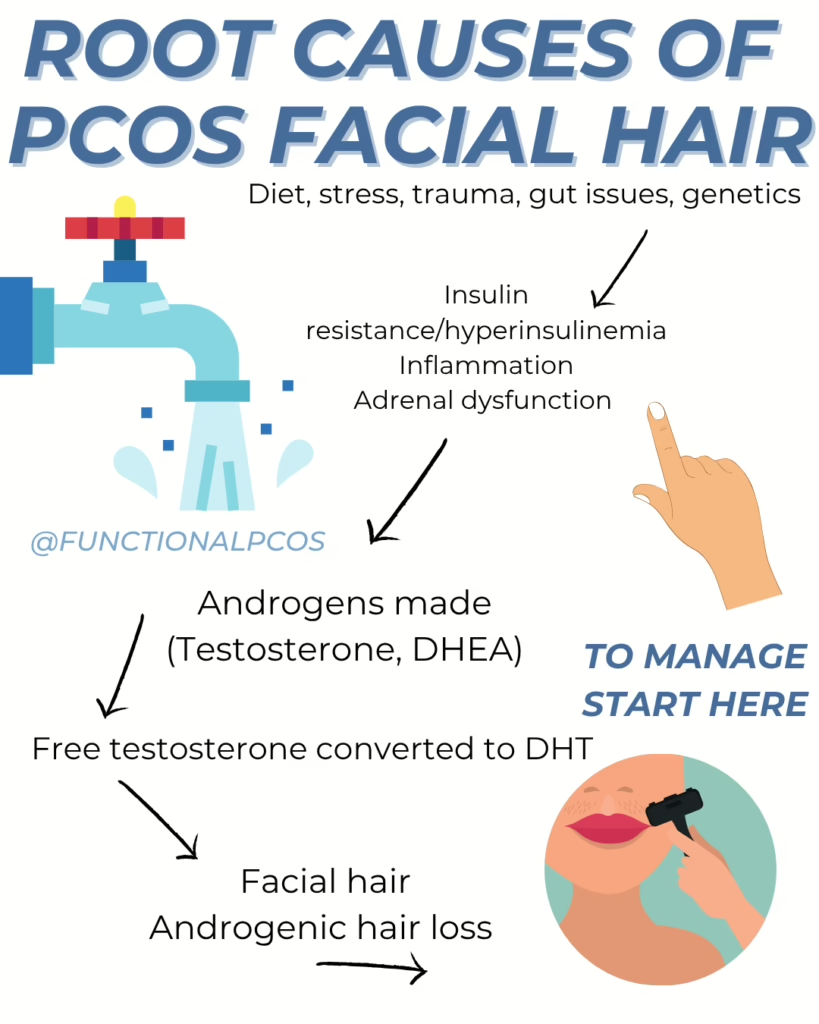
How Androgens Trigger PCOS Facial Hair | Stop Facial Hair Growth Due to PCOS Naturally
When we have excess insulin, inflammation, or stress hormones in our bodies, they send signals to the ovaries to create more testosterone.
Once testosterone is made, it can be converted a few different ways. It can go down the path to becoming estrogen, but in PCOS, it often prefers to go down the path to becoming DHT. This is because of an enzyme called aromatase.
Aromatase does the work of converting testosterone into DHT and we unintentionally create more aromatase when we eat diets higher in sugar, starch, alcohol, or low in fiber.
There are three steps on the pathway to reducing this conversion process.
First, we need to stop the extra hormones being created at the source. Second, we need to bind up extra testosterone already circulating. And third, we need to block the DHT pathway.
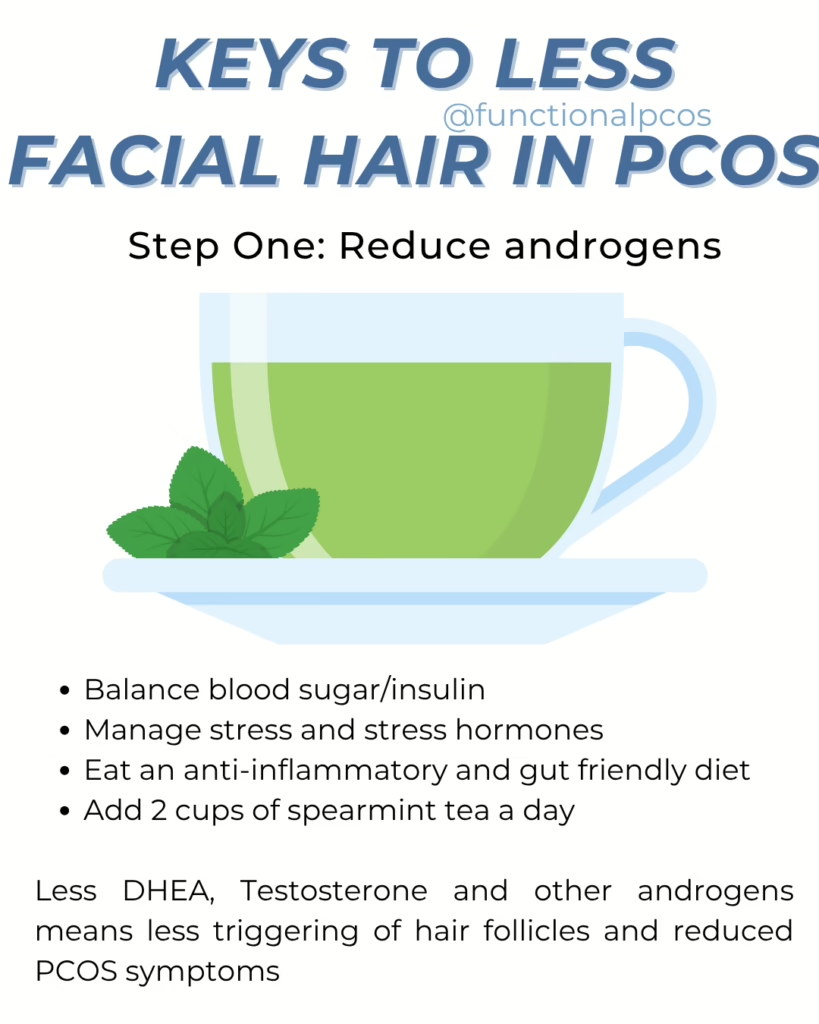
Step One: Lower Androgens at the Root
Balance insulin, reduce stress, and support hormone detox
The first step to naturally reduce facial hair with PCOS is to lower the overall amount of androgens in the body. Here’s how:
🔑 How to lower androgens:
Balance blood sugar and insulin:
Here’s a podcast I recorded on managing insulin in PCOS that might help!
This is non-negotiable. Insulin resistance drives excess testosterone. Start by building meals around protein, fiber, and healthy fats.
BTW it you’re using a GLP-1 medication for PCOS, I wrote an article on that here. It might help to combine that understanding with this.Manage stress and cortisol:
High stress = high DHEA. Practice nervous system regulation, get consistent sleep, and say no more often.Support gut and liver detox pathways:
Here’s an article on anti-inflammatory foods that help PCOS.
Eat anti-inflammatory foods, support gut health, and avoid ultra-processed junk that inflames the system.Drink 2 cups of spearmint tea daily:
This is one of the best natural methods for reducing PCOS facial hair. Research shows it can lower free testosterone levels over time plus it’s calming and tasty.- I wrote a whole article on spearmint tea for PCOS. Find that here.
- I wrote a whole article on spearmint tea for PCOS. Find that here.
Reducing overall androgen load helps calm the hormonal messaging that triggers facial hair growth in the first place.
Step Two: Bind Up Testosterone
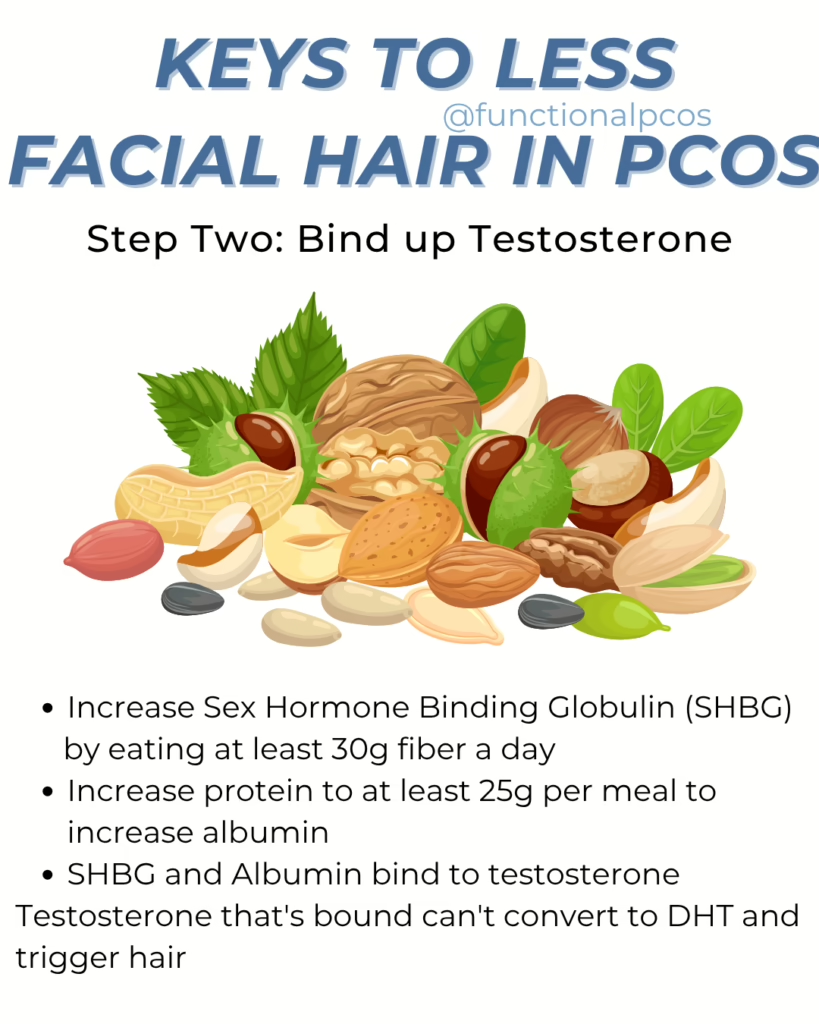
So it can’t turn into the form that triggers hair
Even when androgens are present, they don’t cause issues unless they’re free and unbound in the bloodstream. You want more of your testosterone safely “bound” by proteins like SHBG (sex hormone binding globulin) and albumin.
🔐 How to increase SHBG and albumin:
Eat more fiber. Aim for at least 30g per day
If you struggle to get enough, you can also bridge the gaps with a fiber supplement like this one, just make sure you drink plenty of water with it.
Think: veggies, seeds, nuts, beans, and whole grainsHit at least 25g of protein per meal
and helps bind up testosterone.
This supports albumin, a protein made in the liver that keeps blood sugar stable
Bound testosterone = less conversion to DHT, and less hair-triggering activity at the follicle level.
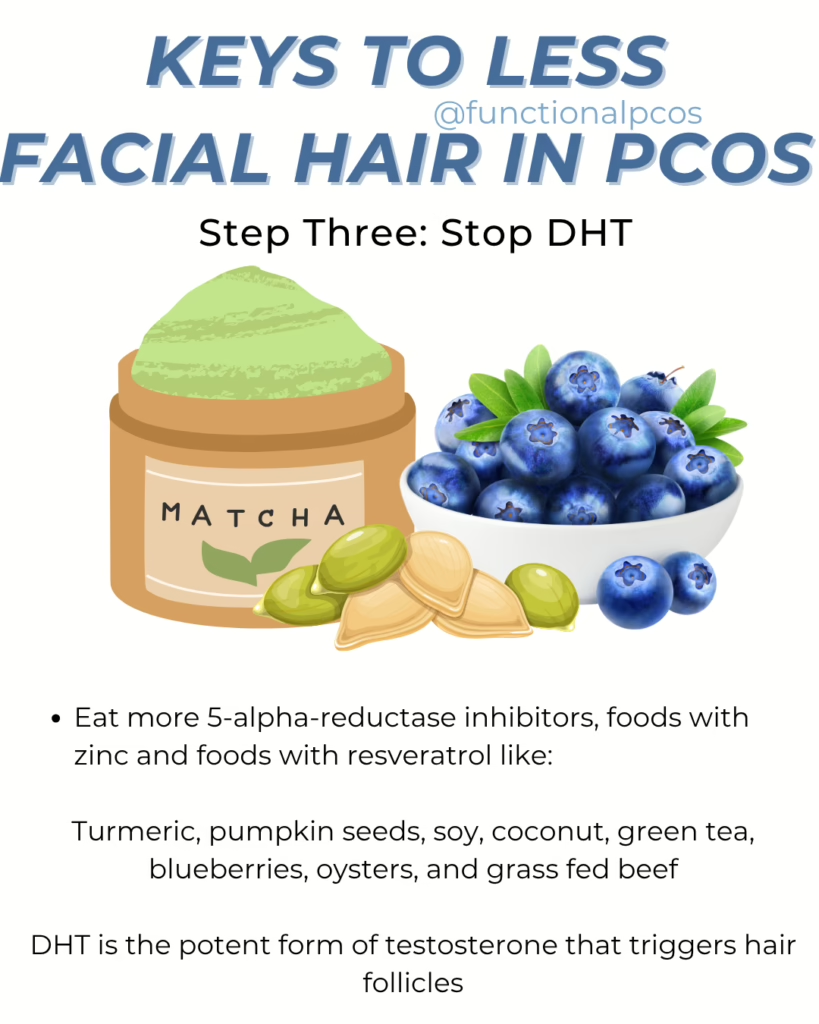
Step Three: Block the DHT Pathway
Stop testosterone from converting to its most potent form
DHT (dihydrotestosterone) is the most powerful androgen and the one most directly linked to facial hair, acne, and scalp hair loss in PCOS.
To reduce facial hair naturally, you want to block the enzyme that converts testosterone to DHT as often as possible: 5-alpha-reductase.
🚫 How to block DHT naturally:
Eat more zinc and resveratrol-rich food
You might also consider supplementing with zinc or a resveratrol blend. I have a PCOS facial hair support protocol on fullscript that you might like, find that here.
Include natural 5-alpha-reductase inhibitors like:
Pumpkin seeds
Green tea / matcha
Blueberries
Turmeric
Soy
Coconut
Oysters
Grass-fed beef
By inhibiting DHT conversion, you reduce that final “hair-triggering” step while still allowing your body to use the testosterone it needs.
The Bottom Line | Stop Facial Hair Growth Due to PCOS Naturally
Reducing facial hair growth naturally with PCOS takes time, but it’s absolutely possible when you focus on root-cause strategies.
This isn’t about masking symptoms. It’s about understanding your hormones, supporting your metabolism, and giving your body the signals it needs to rebalance.
If you want step-by-step support, I walk you through everything in my Facial Hair Freedom course from labs and nutrition to supplements and lifestyle.
💡 Bonus: What About Supplements?
Want to learn about the most evidence-based supplements for facial hair reduction?
Check out my article on PCOS supplements for facial hair here.
- Share on Pinterest (Opens in new window)Pinterest
- Share using Native toolsShareCopied to clipboard
- Share on X (Opens in new window)X
- Share on Print (Opens in new window)Print
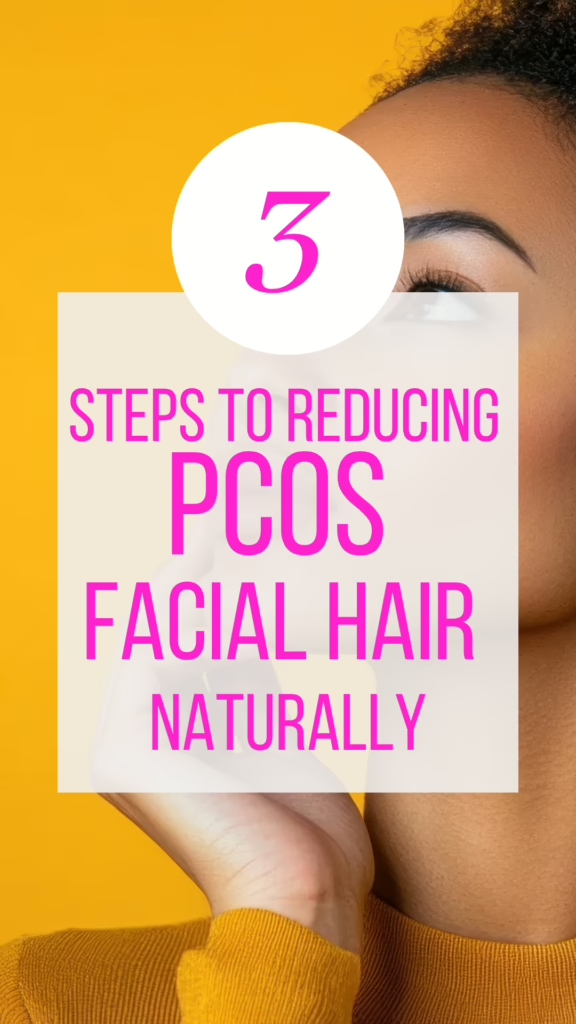
How to Stop Facial Hair Growth Due to PCOS Naturally
Amber Fischer, MS, CNS, Functional Nutritionist
June 15, 2025
MEdical Disclaimer
The information contained on amberfischernutrition.com is for informational and education purposes only and should not be construed as medical advice. As a nutrition professional, I draw upon evidence based practices and personal experience with myself and clients to form recommendations like the ones made in this guide. You are an individual with your own unique set of health goals and concerns. Ensure you discuss any changes to your diet with a qualified healthcare professional, like your doctor, to ensure these changes are right for you. This is especially important if you have any other underlying medical conditions. Do not consume foods you are allergic to. Results will be individual and will vary.
Affiliate Disclosure
This site contains affiliate links. When you make a purchase through a link provided on this website, I may make a small commission. This does not add to the purchase price of the item. I only link to items I truly use and recommend.